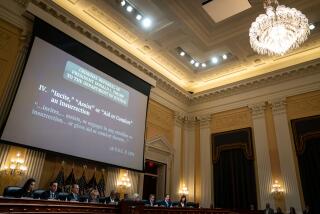Enron’s Tax Records Reveal Manipulation, Official Says
- Share via
WASHINGTON — Enron Corp.’s tax returns show “disturbing” efforts to manipulate taxes at the energy trader and “eye-popping” revelations about executive compensation, Senate Finance Committee Chairman Charles E. Grassley said Wednesday.
A report on Enron’s tax returns by the congressional Joint Committee on Taxation will be examined today at a Finance Committee hearing looking into whether legislation is needed to curb the use of tax shelters and other loopholes.
Last March, Iowa Republican Grassley and the Finance Committee’s ranking Democrat Max Baucus of Montana, then the panel’s chairman, asked the joint committee to analyze Enron’s tax records back to 1985.
They asked the committee to determine whether the energy trader’s tax practices were legal, somewhat questionable, highly questionable or even illegal.
Officials have been tight-lipped about the results, saying they are bound by an agreement with Enron not to release the details of its tax returns outside official committee hearings.
But Grassley said Wednesday: “I’ve not been briefed, but I’m informed by the Finance Committee staff that the report is an absolute barnburner.
“In addition to the eye-popping account of executive compensation, the report provides for the first time the complete story of Enron’s efforts to manipulate its taxes and accounting. The report is very disturbing in its findings,” he said on Capitol Hill.
“There’s going to be a lot of outrage” when the report is released, Grassley said late Wednesday, on CNBC’s Capital Report. “You’re going to find that there’s just terrible abuse of corporate governance.”
Baucus, appearing on the same television program, said Enron and its advisors, accountants, investment bankers and lawyers “had a cozy little relationship where they frankly just overwhelmed the IRS with the complexity” of the company’s transactions.
“The IRS really couldn’t figure it out even if it tried,” Baucus said.
Enron filed for bankruptcy protection in December 2001, amid revelations of secret off-the-books partnerships that hid debt and enriched certain executives.
A year ago, Citizens for Tax Justice, a labor-backed tax research group, analyzed Enron’s financial reports for 1996 through 2000 and said Enron did not pay U.S. taxes in four of those five years.
The group said Enron had used hundreds of subsidiaries in tax-haven countries, as well as deductions for stock options, to avoid paying taxes.
Lawmakers say the new Joint Committee on Taxation study is crucial toward shaping legislation to curb aggressive tax strategies -- an area of corporate reform left undone by Congress last year as it focused on cracking down on sham accounting.
Grassley has said the Finance Committee might need to revise legislation it has already approved to give the Internal Revenue Service more authority to police tax shelters.
The Finance Committee will hear testimony from Lindy L. Paull, chief of staff of the Joint Committee on Taxation. She declined to discuss the study’s findings Wednesday, citing the confidentiality agreement with Enron.
The Senate panel also will hear from professors in accounting and corporate management, who are expected to help interpret the report.
More to Read
Inside the business of entertainment
The Wide Shot brings you news, analysis and insights on everything from streaming wars to production — and what it all means for the future.
You may occasionally receive promotional content from the Los Angeles Times.










